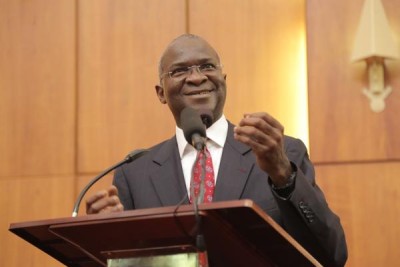
ABUJA, Federal Republic of Nigeria. Minister of Power, Works and Housing, Babatunde Fashola, has unveiled his short and medium term plans for the revitalisation of the nation’s dilapidating infrastructure.
In his maiden interaction with journalists in Abuja yesterday, the former Lagos State governor stated that paucity of funds had compelled the present administration to prioritise its intervention in power, road and housing sectors.
He briefed alongside his Minister of State for Power, Works and Housing, Mustapha Shehuri, and Permanent Secretaries in the ministries, Louis Edozien and Gambo Magaji, respectively.
In the area of power, Fashola said there was a significant low budgetary provision for the sector in 2015, adding that there were 142 transmission projects that were near completion, out of which 22 could be completed within a year at an estimated cost of N40bn.
“There is a 10 megawatts wind energy project in Katsina nearing completion, a 215mw plant in Kaduna and the 3,050mw plant in Mambilla, Taraba State, all of which need to be completed.
“Our first priority is to get contractors to finish on-going transmission contracts to enable us transport the power being generated to the Discos to distribute.
“Our second priority is to ask the governors to help us identify and enumerate their most populous industrial and commercial clusters where manufacturing, fabrication, welding and related productive work is going on, especially by small businesses and to see how we can use the existing legal framework to attract embedded power supply to these people who must be ready to pay for the power.
“The owners of the Discos will be expected to give us their co-operation through flexibility and innovative disposition for emergency interventions while they plan and develop their wholesale roll out plan.
“Our economy cannot wait indefinitely and suffer job losses. If we succeed, we can get a lot of workers back to work in cottage and small industries which are the critical driving forces of our economy,” he said.
The minister also stated government’s intention to continue to slowly stand-down and allow market forces drive the electricity sector; as well as rectify disparity in price of gas to power plants and quickly resolve extant issues between it, owners of the Aba Power and Enugu Electricity Disco.
“Government is now a regulator through the National Electricity Regulatory Commission, NERC, which is like the National Communications Commission, NCC, which regulates Telcos.
“We intend to strengthen this part of our responsibility so that we can hold the Gencos and Discos to their contracts with citizens. But before we do that, we must play our own role of providing gas and expanding the transmission network,” he said.
Fashola said he would task government agencies across the country on timely payment of bills for electricity supplied to them to eliminate revenue losses by the Dicos.
“More importantly as a government and consumer of power through our ministries, departments and agencies, we must show example at federal, state and local governments by paying up backlogs of power bills and ensuring from there that we pay for what we use.
“Our ministry intends to champion this at the federal level and I hope that the state governors, heads of parastatals, national and state assemblies, the various state and federal courts, local governments, military, police, and other related security agencies will find this a worthy undertaking to join and ensure payment of all their electricity bills,” he noted.
He also explained that the Nigerian National Petroleum Corporation, NNPC, had agreed to provide fund and pledged to complete gas lines that would add up to 2,000mw of power to the national grid in the next 15 months.
In the area of road infrastructure, the minister noted that whereas it would require N2 trillion to complete the 206 ongoing projects spread across the six-geo political zones, N13 billion was released out of the N18.132 billion provided in the 2015 budget.
In order to navigate the financial hurdle, Fashola stated that the ministry’s short term strategy was to concentrate on roads that connect states and those that bear heaviest traffic.
However, in view of its strategic significance to the economic development of the nation, the minister said President Muhammadu Buhari had interest in seeing to the early completion of the Lagos-Ibadan Expressway.
Also, as part of efforts to ensure optimal use of the nation’s road infrastructure, Fashola insisted on reclaiming the full width and setback of all federal roads, admonishing all those who had infringed on them to begin to move away in the interest of the public.
He said: “The records that have been made available from previous budgets show that the last time Nigeria budgeted over N200bn in a year’s budget for roads was in 2002. It seems that as our income from oil prices increased over the last decade, our spending on roads decreased.
“As far as status reports go, the Federal Government budgeted N18.132bn in 2015 and the Ministry of Works got N13bn for all roads and highways in 2015, although it has contracts for 206 roads, covering over 6,000km with contract price of over N2trn.
“Our ability to achieve connectivity of roads depends on capital spending in 2016 to pay contractors and get them back to work.
“Our short term strategy will be to start with roads that have made some progress and can be quickly completed to facilitate connectivity.
“We will prioritise within this strategy by choosing first, the roads that connect states together and from that grouping, start with those that bear the heaviest traffic.”
He noted that stoppage of road projects due to failure of government to pay contractors had resulted in acute job losses, adding that over 5,150 workers had been laid off in four major construction companies in the country.
On plans by government to reclaim highways that had been encroached on, the minister said: “In order to make the roads safer, we intend to re-claim the full width and set back of all federal roads, representing 16 per cent and about 36,000km of Nigeria’s road network by immediately now asking all those who are infringing on our highways, whether by parking, trading, or erection of any inappropriate structure to immediately remove, relocate or dismantle such things voluntarily.
“This will be the biggest contribution that citizens can offer our country as proof that we all want things to change for the better.
“For clarity, it is important to say that although state governments own 18 per cent of the total road network of about 200,000km, while local governments own the balance of 66 per cent, the 16 per cent owned by the Federal Government carries an estimated 70 per cent of the total traffic because of their length, width and inter-state connectivity.
“For those who seek us to compel them to stop these habits of the past, our resolve to do so will be unyielding, because that resolve represents the will of the majority of Nigerians expressed through 15,424,921 votes of Nigerians who mandated our president to effect change.”
As part of strategies to ensure continued maintenance of the nation’s highway, the minister said his ministry would bring back tolling system as well as undertake the construction of weigh bridges.
He maintained that the installation of weigh bridges would enable the country elongate the lifespan of her roads, insisting that road users would rather comply with the specified load requirement or be made to pay heavy fines.
Also speaking on the strategies to address the various inhibitions to housing provision in the country, the minister stated that the immediate priority of government was to review the National Housing Policies.
Apart from that, he noted that government would lead the aggressive intervention to increase supply by undertaking construction of public sector participation and ownership with a view to reducing the current housing deficit put at 17 million units.
The minister, who averred that the country must rev up national housing budget from the current N1.8bn to hundreds of billions if it must meet its housing needs, however doubted the accuracy of the much touted 17 million units deficit.
In order to enable the present administration adequately prepare to address the shortfall, Fashola said the ministry would undertake a process of scientific assessment to define the accuracy of the 17 million figure as well as the actual demand.
Credit: National Mirror (Nigeria)




